TL;DR: If you want to bring an idea into the world, you should do this program…with a few caveats.
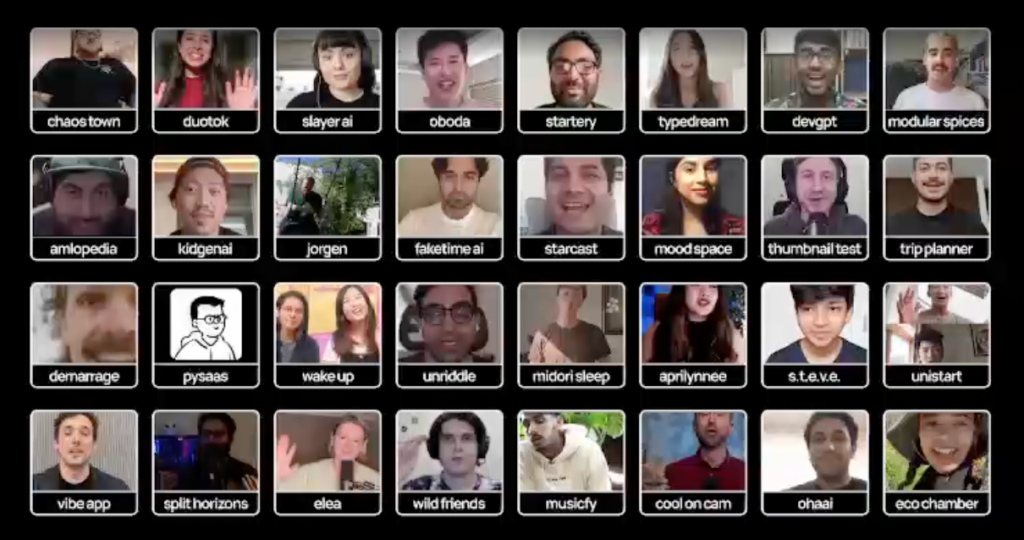
Thanks to Buildspace, I found myself in the running for $100,000 last week. I was one of 16 people—whittled down from 7,500—who had a shot.
I didn’t win it.
But it doesn’t matter. My ROI from this was huge.
I run a live online course that’s growing beautifully. But I only run it twice a year. Two major revenue recognition events a year can feel frustrating and limiting. I wanted to create a self-paced course so I had a digital product as a year-round revenue stream.
The first attempt happened almost 18 months ago. I got halfway through and lost momentum because of other projects, which in retrospect was just an excuse for not feeling confident about my work.
The second attempt happened six months ago. I designed and filmed the course and a landing page. When I shared it with friends and beta testers, it was clear that what I built was not resonating and was not at the quality bar I wanted.
Shit.
At this point, negativity and insecurity around this project is starting to fester. Then I had an idea: why not see if I could take this through Buildspace? I’ve heard of their program and it seemed like I had nothing to lose. So I applied.

What is Buildspace?
Buildspace is an a16z- and Y Combinator-backed school that helps people create things. I’d be more specific, but the company is vague about who they help and what they do. They never explain why and it’s not an accident.
My hunch is that they believe that specific words—such as “builder,” “maker,” “entrepreneur,” “creator,” “startup,” “marketing,” “accelerator”—have baggage. These words resonate with people who already feel interested in those concepts. But for people unfamiliar with swimming in those particular waters, these words are intimidating. To a lot of people, the word “marketing” feels gross. It conjures up images of attention-seeking social media-obsessed idiots. Same for “entrepreneurship.” In some corners of the internet, that word reeks of hustle-culture bros.
Buildspace is in scale mode, and it is designed to bring maximum people into the fold. And it’s working.
What is Nights and Weekends?
TL;DR: Buildspace provides a more modern, engaging, and relevant education in entrepreneurship and marketing than 99% of what I’ve seen on the internet. I build entrepreneurship programs for a living and I am a critical bastard about educational experiences. This one was impressive.
They call their program “Nights and Weekends.” They never refer to it as an accelerator, but it’s basically a 6-week virtual accelerator program. They host lectures from Buildspace CEO Farza (useful) and some high-profile guest speakers (sometimes useful).
The core of the program involves doing challenges; they ask you to do specific tasks around creating, gathering feedback, and marketing your idea. Buildspace shines here. I’ve participated in (and led) accelerator programs where the output was a pitch deck. Most pitch decks are based on flawed assumptions because the founders didn’t get the product to interact with enough reality. The Buildspace team has a deep understanding that shipping, i.e. making [the thing] and letting the world give you feedback on [the thing] is paramount.
You can create anything you want in Buildspace: we had musicians making albums, founders building products, artists creating manga, engineers designing airplane engines, and more. They are explicit about how they won’t teach you subject matter. So if you want to design a community garden, they can’t teach you about gardening. Their argument is that the internet is the greatest force for subject matter education in the world so you should be resourceful enough to figure that out on your own. What they give you is an entrepreneurship-flavored process for executing on that idea and bringing it to others.
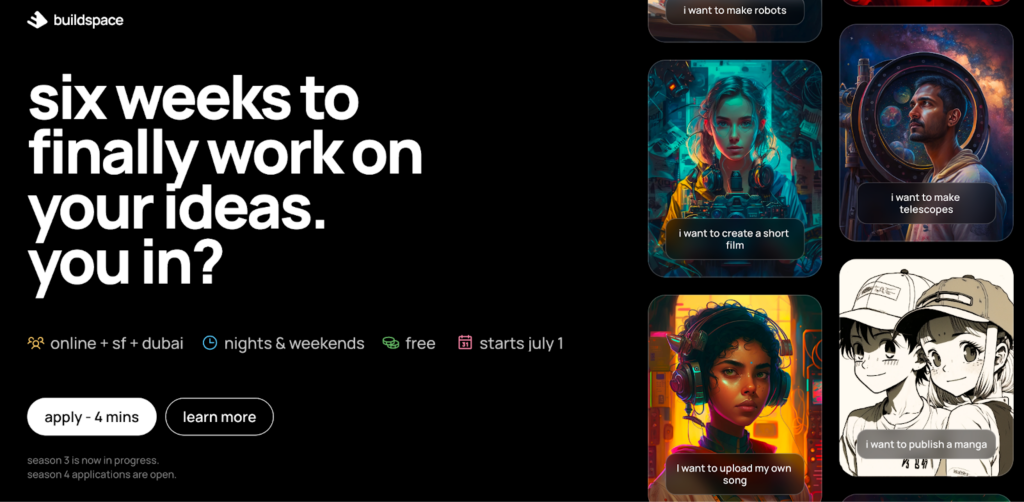
What Stood Out
Anti-Networking: Farza actively discourages networking early on, which is brilliant. He wants people to make progress on their projects first and make connections and bonds later. This move establishes one of Buildspace’s core values: doing matters more than talking about doing. There is no groupchat. No Slack. No LMS. No Circle. There is a Discord that they slip into things when the time is right.
Playful Competition and Community: They had a leaderboard of “points” that tracked project progress. Even cooler, they created Harry Potter-like houses that helped created a fun sense of community.
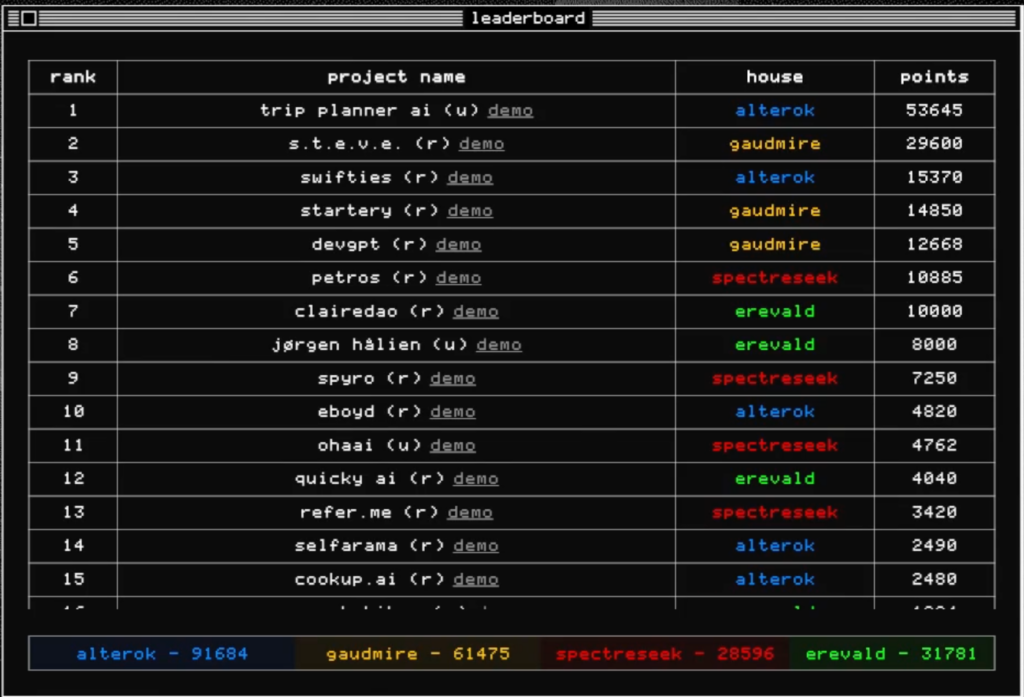
Tools in the Program: I am skilled at Twitch, Figma, and video editing, so I didn’t struggle. But if you aren’t semi-competent at those, there is a learning curve. I’m still preparing my feedback for the Buildspace team, but their participants would benefit tremendously from more communication about these tools and tech before the program gets started.
The Tech Stack: Buildspace made their own Chrome extension that had a countdown of how many days until demo day and links to resources and program updates. This was insanely cool and I predict that this will become common practice in the future.
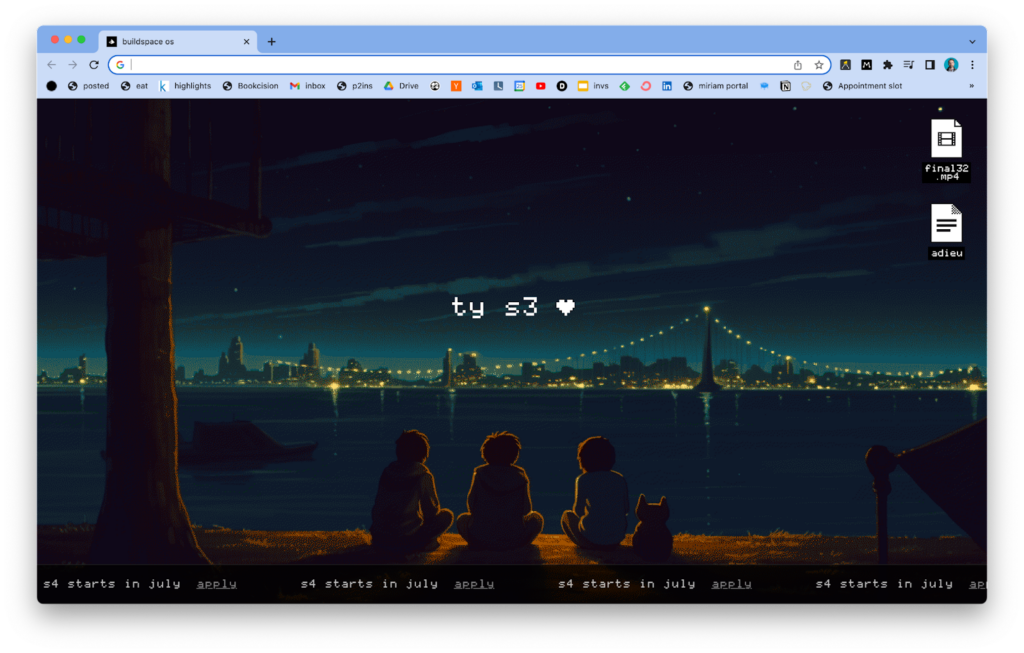
Big Mood: Buildspace is heavy on vibes. They are big on anime imagery. Memes abound. They never use capital letters in their emails. All of this is to remind you that this community has strong culture and opinions, with the end goal of creating awesome doers aligned with their ethos. They aren’t for everyone, but if you’re a specific type of person, you will like their style. I certainly did, and I was old enough to be most people’s dads in the program.
Video-First Communications: They were incredibly skilled with their use of video in the marketing, onboarding, and live sessions. By skilled, I am not referring to the production quality (although it was great). I’m referring to the playfulness and warmth of the videos, which I think helped a cohort of nervous people get in the right frame of mind to go ham. I’m biased on this front because I get paid to teach people video, but I think what they did will become table stakes for anyone trying to run an excellent online program.
“We don’t work very hard to keep you here:” They admitted a ton of people in this program, knowing that most will fall by the wayside. And because the program is virtual, the difference between serving a few hundred people doesn’t matter that much. For an in-person program, the difference of a few hundred people has massive implications for staffing, venues, and more. What this means is that they are maximally inclusive and let many people in the door. But if you stop showing up, they aren’t going to check in and ask about you. There is minimal personalized attention. They are up front about this. I loved this: you don’t start meeting people until a couple of weeks in, and by then, the people still around are the people serious about building.
Aligned With Reality: A lot of educational programs give you information (which in a GPT-colored world gets less valuable by the day) rather than focus on taking action. The information Buildspace gives is not only current and relevant, the curriculum forces you to build in public every step of the way. If you do the challenges they give, there is no way your project won’t make major progress. I sold a couple of thousand dollars of my course and I built significantly faster than I would have been able to do on my own, and I’m not even sure I could have finished this on my own in the first place.
Demo Day: The demo day was a joy. Using Discord Stages, we got to hear what each person was working on. It was the first chance I got to have face-to-face conversations with other participants, which was awesome. We could have used more of this earlier.
The Prize: Buildspace offers a $100k prize to certain participants who make a certain level of progress during the program. This was wild and a cool way to learn about the journey of various projects. Through a semi-convoluted process, the Buildspace community voted on projects to advance. This was thrilling to witness (and in my case, get to be part of).
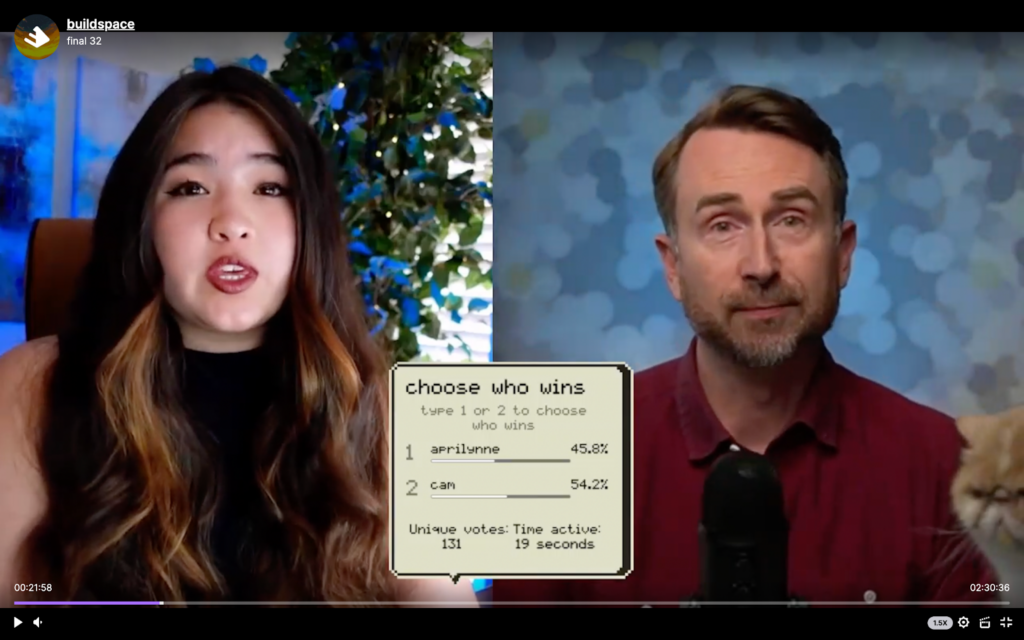
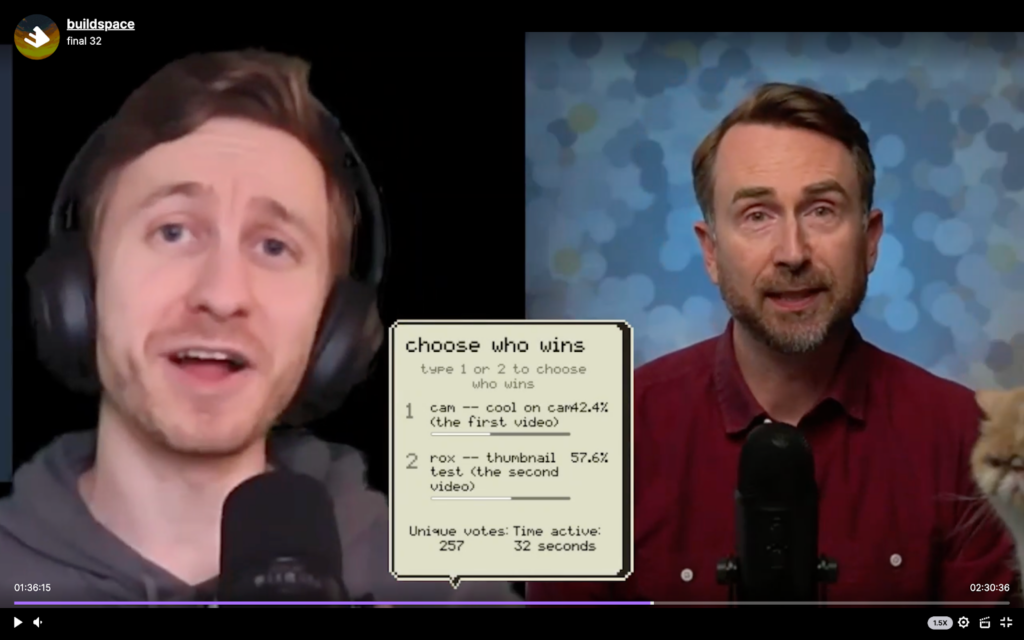
Less Thinking, More Doing
This program helped me get over a stumbling block. I had fallen into a common entrepreneur trap; the project I was pursuing—building a self-paced course—was important but not urgent. And sometimes as entrepreneurs, we over index on customers who pay now as opposed to more scalable money later.
Buildspace got me where I needed to go.
If you have an inkling of an idea for something you want to make, this decision is a no brainer. Just apply to the damn program already. It costs nothing and it will give you a powerful structure, ethos, and community to build something great.
The next cohort starts in July: go apply.
(In case anyone is curious, the course I built is a self-paced course on camera confidence for Zoom and making video: Get Cool on Cam. It made a few thousand dollars and is an invaluable strategic complement to my work.)
Thanks to early readers: Ved Sparks, Santiago Gunter
For weekly tips on creating video and entrepreneurship, join my newsletter or claim your spot in my cohort-based course, Minimum Viable Video, which teaches camera confidence, fundamentals of video production, and on camera storytelling.
